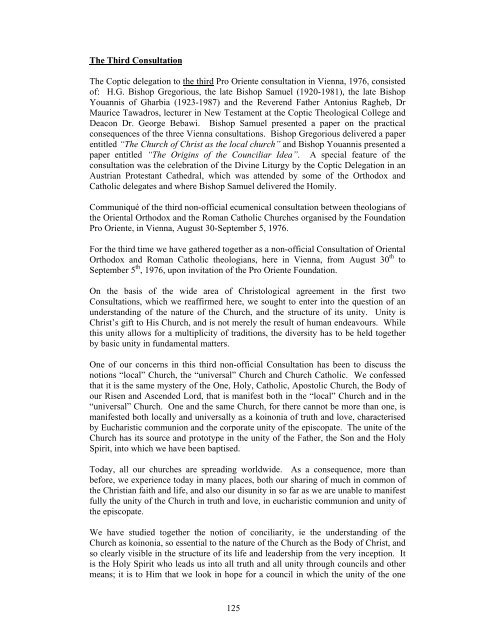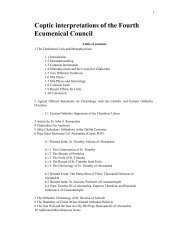Coptic Church & Ecumenical Movement - Saint Mina Coptic ...
Coptic Church & Ecumenical Movement - Saint Mina Coptic ...
Coptic Church & Ecumenical Movement - Saint Mina Coptic ...
Create successful ePaper yourself
Turn your PDF publications into a flip-book with our unique Google optimized e-Paper software.
The Third Consultation<br />
The <strong>Coptic</strong> delegation to the third Pro Oriente consultation in Vienna, 1976, consisted<br />
of: H.G. Bishop Gregorious, the late Bishop Samuel (1920-1981), the late Bishop<br />
Youannis of Gharbia (1923-1987) and the Reverend Father Antonius Ragheb, Dr<br />
Maurice Tawadros, lecturer in New Testament at the <strong>Coptic</strong> Theological College and<br />
Deacon Dr. George Bebawi. Bishop Samuel presented a paper on the practical<br />
consequences of the three Vienna consultations. Bishop Gregorious delivered a paper<br />
entitled “The <strong>Church</strong> of Christ as the local church” and Bishop Youannis presented a<br />
paper entitled “The Origins of the Counciliar Idea”. A special feature of the<br />
consultation was the celebration of the Divine Liturgy by the <strong>Coptic</strong> Delegation in an<br />
Austrian Protestant Cathedral, which was attended by some of the Orthodox and<br />
Catholic delegates and where Bishop Samuel delivered the Homily.<br />
Communiqué of the third non-official ecumenical consultation between theologians of<br />
the Oriental Orthodox and the Roman Catholic <strong>Church</strong>es organised by the Foundation<br />
Pro Oriente, in Vienna, August 30-September 5, 1976.<br />
For the third time we have gathered together as a non-official Consultation of Oriental<br />
Orthodox and Roman Catholic theologians, here in Vienna, from August 30 th to<br />
September 5 th , 1976, upon invitation of the Pro Oriente Foundation.<br />
On the basis of the wide area of Christological agreement in the first two<br />
Consultations, which we reaffirmed here, we sought to enter into the question of an<br />
understanding of the nature of the <strong>Church</strong>, and the structure of its unity. Unity is<br />
Christ’s gift to His <strong>Church</strong>, and is not merely the result of human endeavours. While<br />
this unity allows for a multiplicity of traditions, the diversity has to be held together<br />
by basic unity in fundamental matters.<br />
One of our concerns in this third non-official Consultation has been to discuss the<br />
notions “local” <strong>Church</strong>, the “universal” <strong>Church</strong> and <strong>Church</strong> Catholic. We confessed<br />
that it is the same mystery of the One, Holy, Catholic, Apostolic <strong>Church</strong>, the Body of<br />
our Risen and Ascended Lord, that is manifest both in the “local” <strong>Church</strong> and in the<br />
“universal” <strong>Church</strong>. One and the same <strong>Church</strong>, for there cannot be more than one, is<br />
manifested both locally and universally as a koinonia of truth and love, characterised<br />
by Eucharistic communion and the corporate unity of the episcopate. The unite of the<br />
<strong>Church</strong> has its source and prototype in the unity of the Father, the Son and the Holy<br />
Spirit, into which we have been baptised.<br />
Today, all our churches are spreading worldwide. As a consequence, more than<br />
before, we experience today in many places, both our sharing of much in common of<br />
the Christian faith and life, and also our disunity in so far as we are unable to manifest<br />
fully the unity of the <strong>Church</strong> in truth and love, in eucharistic communion and unity of<br />
the episcopate.<br />
We have studied together the notion of conciliarity, ie the understanding of the<br />
<strong>Church</strong> as koinonia, so essential to the nature of the <strong>Church</strong> as the Body of Christ, and<br />
so clearly visible in the structure of its life and leadership from the very inception. It<br />
is the Holy Spirit who leads us into all truth and all unity through councils and other<br />
means; it is to Him that we look in hope for a council in which the unity of the one<br />
125








